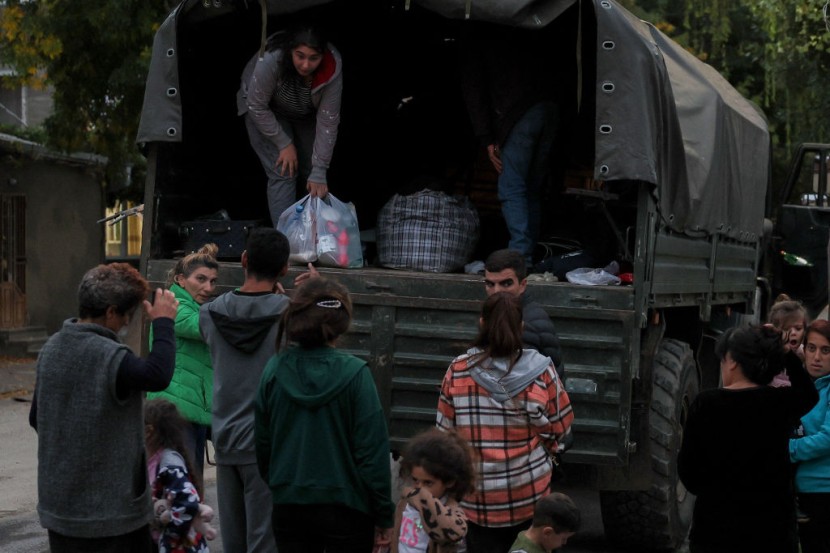
The ethnic Armenian Republic of Artsakh - which until last week has been governing Nagorno-Karabakh within Azerbaijan's internationally recognized borders - has announced Thursday (September 28) it would cease to exist effective January 1, 2024.
The announcement effectively put an end to almost 30 years of experimental independent rule of the Armenian enclave.
The Associated Press reported that the region's final president signed a decree, Samvel Shakhramanyan, cited a September 20 agreement had been reached that ended the fighting and, at the same time, also compelled Baku to allow the "free, voluntary, and unhindered movement" of Armenian residents of the region into Armenia.
Most residents fleeing the area do so through the Lachin Corridor, a strip of land that surrounds the road that connects Armenia with Nagorno-Karabakh.
War in the Caucasus
Nagorno-Karabakh, and the territories of both Armenia and Azerbaijan, has been a flashpoint of geopolitical tensions ever since the interaction of ethnic Armenians and the Turkic peoples - of which a majority of both Turkey and Azerbaijan originated from - migrating westward into Europe.
The situation exacerbated as Armenia became the first nation to adopt Christianity as its state religion and the Turkic peoples adopted Islam.
In more modern historical records, both Armenia and Azerbaijan were subjugated by the Russian Empire and the Soviet Union. During the First World War, hundreds of thousands of Armenians were killed in what the world now calls the Armenian Genocide, which both Turkey and Azerbaijan defiantly deny to this day.
When the Soviet Union fell, Armenia and Azerbaijan fought a six-year war over Nagorno-Karabakh after the region expressed its intention in becoming a part of the Armenian state. Both countries also fought for six weeks in 2020, and most recently, for around 24 hours last week after Baku alleged Armenia was using the Lachin Corridor to extract minerals out of the region and smuggling in illicit weapons for separatist fighters. Officials in Yerevan have denied the allegations, but it did not stop Azerbaijani forces from closing the road into and out of Nagorno-Karabakh, resulting in massive food and basic supplies to the region.
Armenian Exodus
After the ceasefire, Azerbaijani authorities pledged they would respect the rights of ethnic Armenians in the region and restore supplies. However, Armenian residents have decided to leave their homes behind rather than becoming an Azerbaijani citizen out of fears of ethnic cleansing and reprisals by ethnic Azeris.
Unlike the flight of Armenians in areas retaken by Azerbaijan in 2020, where they applied a scorched-earth policy before leaving for Armenia, there have been no reports so far of residents burning down their homes before leaving Artsakh for good.
In the ensuing exodus, a fuel reservoir exploded at a gas station in the regional capital Stepanakert Monday (September 25), which resulted in the deaths of at least 68 people and left nearly 300 injured.
Yerevan officials reported over half of the region's population - around 66,000 people - have relocated to Armenia as of Thursday. Observers further speculated Armenia would grant Nagorno-Karabakh full citizenships due to their ethnicity.
Fate of Artsakh Leaders, Remnants Post-Dissolution Uncertain
It is still speculated if the whole Armenian population of Nagorno-Karabakh would leave the region, as Artsakh presidential adviser David Babayan earlier suggested, but Shakhramanyan's decree urged ethnic Armenians - even those who already left - to familiarize themselves with Azerbaijan's reintegration conditions to make individualized choices whether to stay in Nagorno-Karabakh or to leave for Armenia.
As for most of the former and outgoing authorities of the region, their fates are either uncertain or bleak.
Azerbaijani authorities have arrested and charged former Artsakh president and billionaire banker Ruben Vardanyan this week with financing terrorism, creating illegal armed formations and illegally crossing a state border. If convicted, he would face up to 14 years in prison, Russian state news agency RIA Novosti reported. Baku officials alleged that Vardanyan, who made his fortune in Russia, was arrested while attempting to escape Nagorno-Karabakh for Armenia.
As for Babayan, he announced Thursday he would surrender to Azerbaijani authorities after he was summoned to Baku for a "proper investigation." He said he would leave Stepanakert and hand himself over to Azerbaijani authorities in the nearby city of Shusha, which has been under Baku's control since 2020.
"My failure to appear, or worse, my escape, will cause serious harm to our long-suffering people, to many people," he wrote on Facebook, "and I - as an honest person, hard worker, patriot, and a Christian - cannot allow this."
Babayan did not say when he would plan to surrender.
© 2025 HNGN, All rights reserved. Do not reproduce without permission.








